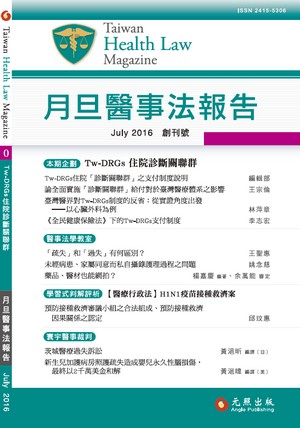論全面實施「診斷關聯群」給付對於臺灣醫療體系之影響【本期企劃】 試閱
The Impact of Tw-DRGs Full Implementation with the Payment System for Healthcare System in Taiwan
「診斷關聯群」,是臺灣正欲全面施行的健保前瞻性支付制度。此制度創始於美國,其精神在於以「同病同酬」,減少醫療浪費,增進醫院效率,實施已30餘年。而臺灣以實施全民健康保險20年之經驗,目前若全面實施「診斷關聯群」給付制度,可能對醫療產生許多衝擊。諸如:低廉成本壓縮品質、內科複雜難以適用、醫師承擔不必要盈虧風險、臨床裁量權之喪失、給付計算基礎未明確、急性後期照護尚未完備、「囚徒困境」之惡果、「費用轉移」抵銷作用、人球事件、「診斷關聯群取巧」手段、分級轉診未落實、以「管理」為中心的醫療,及診斷未確定病人之不適用性等。最後,Tw-DRGs涉及人民生存權及身體權之保護,應有「法律保留」原則之適用!
Since 2010, Taiwan’s Health Insurance Department (NHI)has proposed the diagnosis related group (Tw-DRGs), and intends to full import the payment system in 2016. This payment system originate from the United States and has implemented for more than 30 years. In order to effectively control the growth of medical expenditures and maintain good healthcare quality, this the payment system designed to bind the homogeneous units of hospital activities to the same prices.
Some medical profession think that under National Health Insurance, it was unreasonable to implement DRGs. For example, it may lower medical quality, and it’s too complex for internal medicine to implement. Also, there has the difference between health insurance covers and real costs, and the failure of medical referral system. Finally, Tw-DRGs is related to the right of existence and physical autonomy, so principle of reservation shall be applied.
034-055






